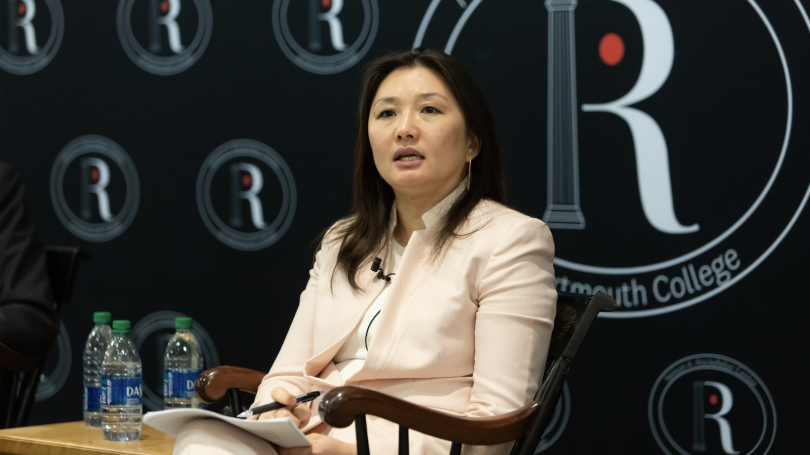
- Public Policy
- Leadership
- Funding
- News & Events
- About the Center
Back to Top Nav
Back to Top Nav
Back to Top Nav
Back to Top Nav
On Tuesday, May 2, 2023, The Rockefeller Center hosted Jeannie Suk Gersen, the John H. Watson Professor of Law at Harvard Law School, who discussed the future of affirmative action with Professor Herschel Nachlis. Gersen's talk was the 2023 Stephen R. Volk '57 Lecture, the Thurlow M. Gordon 1906 Lecture, and was a part of the Dartmouth Laywer Association's annual Law Day Celebration. The event was co-sponsored by the Department of Government, the Ethics Institute, and the Associate Dean for Social Sciences.
The Supreme Court is expected to rule on Students for Fair Admissions v. Harvard by June, a case which will determine the future of affirmative action in America. Gersen holds a "widely-shared belief" that the Court will overrule precedent and ban race from being used in college admissions. She argued that the "civil rights consensus," established by the Warren Court, is "in the midst of being toppled."
To contextualize affirmative action in legal history, Gersen touched on several race-related Supreme Court decisions. She began with Plessy v. Ferguson, the 1896 ruling that established "separate but equal" as constitutional. She focused on Justice John Marshall Harlan's famous dissent, which identified the two theories that influence race-related rulings today. These theories are "anti-subordination theory" which dictates that the law should not underwrite a racial hierarchy, and "anti-classification theory" which presents the Constitution as color-blind.
Gersen pointed out that Harlan's words originally supported each other but no longer do.
"Both theories pointed in the same direction, which was to disapprove of segregation," Gersen said. "But over time those theories have diverged and become oppositional."
The first case to deal with affirmative action was Regents of the University of California v. Bakke in 1978. The Court ruled that "past experiences" were not a valid reason for admission, but "diversity of the student body" was a valid compelling interest. Gersen characterized this ruling as a rejection of anti-subordination rationale and lamented the "road not taken" which would have been to allow remedying past social discrimination as a compelling interest.
Gersen also discussed the complicated racial history of Harvard College, which is at the center of the affirmative action debate. She noted that Harvard imposed a Jewish quota in the 1920s to prevent Jewish students from overtaking white students. Eventually, this policy led to the modern-day "holistic process" which aims to "assemble a diverse class on many dimensions, including race," according to Gersen.
Speaking on Students for Fair Admissions, Gersen stated that oral arguments indicated that the Court will overturn affirmative action using Harlan's color-blind rationale. She theorized that the Court would point to Brown v. Board of Education, the landmark case that overturned "separate but equal" in 1954, and paint affirmative action as a policy of segregation.
Gersen noted that Harvard warned of "dire" consequences if affirmative action was banned. The College said that without affirmative action, half of Black students and one-third of Hispanic students would not be admitted. Gersen also added that remaining advantages in admissions, such as athletic recruitment, being a child of donors and faculty, and legacy admission benefit white students far more than any other group. Therefore, she concluded, the future without affirmative action could actually hurt Asian-Americans more, despite what many have argued.
Finally, Gersen painted a picture of the post-decision landscape. Unlike Dobbs v. Jackson Women's Health Organization, which turned over abortion legality to the states, Students for Fair Admissions would be a nationwide policy change. In other words, every institution would be affected by the ruling and states would have no way to set their own policy.
Gersen concluded by emphasizing that colleges and universities will not change their goal of campus diversity. Instead of using affirmative action however, they will turn to a combination of "race-neutral" standards that create the same end result.
In the end, Gersen lamented that the Court never acknowledged past social discrimination as a compelling interest for affirmative action. Without a history of systemic discrimination, Gersen posited that affirmative action would not be appropriate; therefore a remedial interest for affirmative action "would have been more candid and honest."
Gersen also serves as a Contributing Writer for The New Yorker.